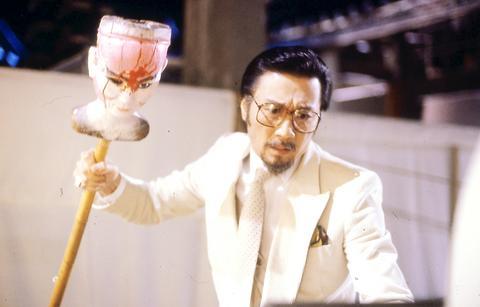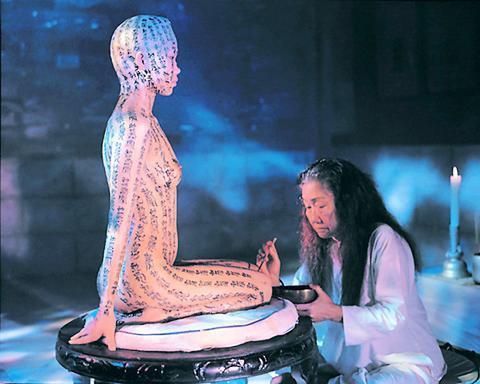Long, disheveled hair and a green dead-pan face, with a long, white robe, standing straight and stiff. This is the classic image of ghosts in Chinese-language films. Different from Western ghost movies, Chinese ghosts are not necessarily scary or evil. They are therefore not categorized as part of the genre of horror films.
The Chinese Phantom Film Festival (

PHOTO COURTESY OF SPOT
As a part of the government-sponsored POP Cinema (

Long before Japanese horror film Ring and its Hollywood remake became hit movies, there have been waves of Chinese-ghost films pulling audiences into
cinemas.
They include Tsui Hark's (
Adapted from the classic novel Liao Chai's Collection of Ghost Stories (
The story was remade into the 1987 hit movie A Chinese Ghost Story, produced by Tsui Hark and starring Leslie Cheung (
At the film festival there will be four screen versions of the same story: The 1960 original, Tsui Hark's 1987 hit and the animated version. There will also be Taiwanese director Yao Feng-pan's (
In the 1980s, kung fu films in Hong Kong declined and the new trend was action and suspense movies, with zombies, or Chinese vampires.
A Chinese vampire is more often than not, more amusing than scary. Most of them wear traditional Chinese outfits such as long gowns or cheongsams and some have funny round hats. Apart from stiff bodies and black kohl around the eyes, these vampires usually have two red, round circles on their cheeks.
In the 10 hit vampire films made in the 1980s, there were a series of weapons to subdue the vampires, such as fire, black sticky rice, Taoist symbols, monk's gowns, peach wood swords, ancestral tablets, even the urine of virgin boys.
For those who missed the recent hit movie Three (
This film has been chosen as the opening film of the festival. For more program information or for English subtitle information, go to www.spot.com.tw.

April 28 to May 4 During the Japanese colonial era, a city’s “first” high school typically served Japanese students, while Taiwanese attended the “second” high school. Only in Taichung was this reversed. That’s because when Taichung First High School opened its doors on May 1, 1915 to serve Taiwanese students who were previously barred from secondary education, it was the only high school in town. Former principal Hideo Azukisawa threatened to quit when the government in 1922 attempted to transfer the “first” designation to a new local high school for Japanese students, leading to this unusual situation. Prior to the Taichung First

The Ministry of Education last month proposed a nationwide ban on mobile devices in schools, aiming to curb concerns over student phone addiction. Under the revised regulation, which will take effect in August, teachers and schools will be required to collect mobile devices — including phones, laptops and wearables devices — for safekeeping during school hours, unless they are being used for educational purposes. For Chang Fong-ching (張鳳琴), the ban will have a positive impact. “It’s a good move,” says the professor in the department of

On April 17, Chinese Nationalist Party (KMT) Chairman Eric Chu (朱立倫) launched a bold campaign to revive and revitalize the KMT base by calling for an impromptu rally at the Taipei prosecutor’s offices to protest recent arrests of KMT recall campaigners over allegations of forgery and fraud involving signatures of dead voters. The protest had no time to apply for permits and was illegal, but that played into the sense of opposition grievance at alleged weaponization of the judiciary by the Democratic Progressive Party (DPP) to “annihilate” the opposition parties. Blamed for faltering recall campaigns and faced with a KMT chair

Article 2 of the Additional Articles of the Constitution of the Republic of China (中華民國憲法增修條文) stipulates that upon a vote of no confidence in the premier, the president can dissolve the legislature within 10 days. If the legislature is dissolved, a new legislative election must be held within 60 days, and the legislators’ terms will then be reckoned from that election. Two weeks ago Taipei Mayor Chiang Wan-an (蔣萬安) of the Chinese Nationalist Party (KMT) proposed that the legislature hold a vote of no confidence in the premier and dare the president to dissolve the legislature. The legislature is currently controlled